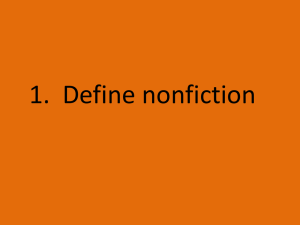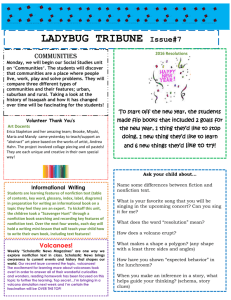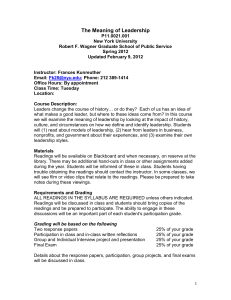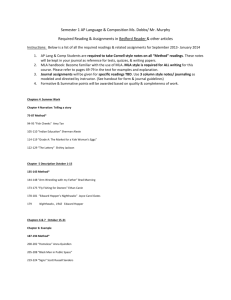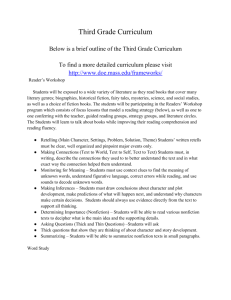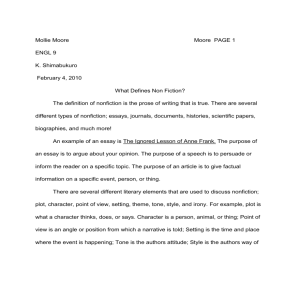SCN 017 - Taxomania
advertisement
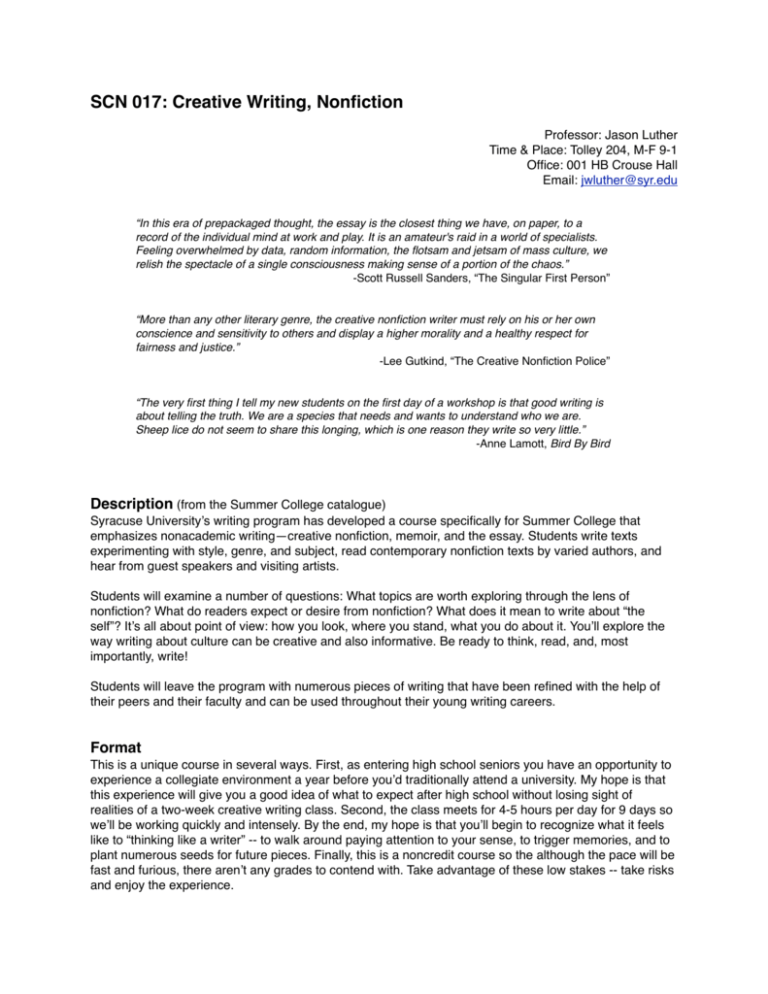
SCN 017: Creative Writing, Nonfiction Professor: Jason Luther Time & Place: Tolley 204, M-F 9-1 Office: 001 HB Crouse Hall Email: jwluther@syr.edu “In this era of prepackaged thought, the essay is the closest thing we have, on paper, to a record of the individual mind at work and play. It is an amateur's raid in a world of specialists. Feeling overwhelmed by data, random information, the flotsam and jetsam of mass culture, we relish the spectacle of a single consciousness making sense of a portion of the chaos.” -Scott Russell Sanders, “The Singular First Person” “More than any other literary genre, the creative nonfiction writer must rely on his or her own conscience and sensitivity to others and display a higher morality and a healthy respect for fairness and justice.” -Lee Gutkind, “The Creative Nonfiction Police” “The very first thing I tell my new students on the first day of a workshop is that good writing is about telling the truth. We are a species that needs and wants to understand who we are. Sheep lice do not seem to share this longing, which is one reason they write so very little.” -Anne Lamott, Bird By Bird Description (from the Summer College catalogue) Syracuse University’s writing program has developed a course specifically for Summer College that emphasizes nonacademic writing—creative nonfiction, memoir, and the essay. Students write texts experimenting with style, genre, and subject, read contemporary nonfiction texts by varied authors, and hear from guest speakers and visiting artists. Students will examine a number of questions: What topics are worth exploring through the lens of nonfiction? What do readers expect or desire from nonfiction? What does it mean to write about “the self”? It’s all about point of view: how you look, where you stand, what you do about it. You’ll explore the way writing about culture can be creative and also informative. Be ready to think, read, and, most importantly, write! Students will leave the program with numerous pieces of writing that have been refined with the help of their peers and their faculty and can be used throughout their young writing careers. Format This is a unique course in several ways. First, as entering high school seniors you have an opportunity to experience a collegiate environment a year before you’d traditionally attend a university. My hope is that this experience will give you a good idea of what to expect after high school without losing sight of realities of a two-week creative writing class. Second, the class meets for 4-5 hours per day for 9 days so we’ll be working quickly and intensely. By the end, my hope is that you’ll begin to recognize what it feels like to “thinking like a writer” -- to walk around paying attention to your sense, to trigger memories, and to plant numerous seeds for future pieces. Finally, this is a noncredit course so the although the pace will be fast and furious, there aren’t any grades to contend with. Take advantage of these low stakes -- take risks and enjoy the experience. Required Reading and Materials • Miller, Brenda, and Suzanne Paola. Tell It Slant. 2nd ed. McGraw-Hill, 2012. Print. Get this at the SU Bookstore • Various readings as assigned on BlackBoard (under “Content”) • A notebook or laptop. We’ll be writing frequently each day, both in class and out. Choose a medium that makes you comfortable and expressive. If you go with a paper notebook, there are many nice ones in the SU Bookstore (adjacent to the course texts, in the basement). They also have nice pens. Choose a set of them that you like. If you have a laptop, be sure you bring your charger. Schedule and readings July 2 Introduction to creative nonfiction Readings for today (in class) • Michael Burkard’s “The Ice Man Cometh” • Sarah Vowell’s “Music Lessons” • Joanna McNaney’s “Clean Slate” July 3 Memory Readings for today Intro & Chapter 1 in Tell It Slant “Table of Figures” by Brenda Miller “Lambing Midwife” and “Gestating Memory” by Valerie Due from “Identity: Skin Blood Heart” by Minnie Bruce Pratt Guest: Minnie Bruce Pratt July 4 No class; get a good start reading your book and write, write, write July 5 People and places Readings for today Chapters 2 & 3 in Tell It Slant “On the Necessity of Turning Oneself Into a Character” by Phillip Lopate “Roadkill” by Kate Krautkramer “Violation” by Sally Tisdale TBA by Emma DeMilta Guest: Emma DeMilta July 6 Narrative Readings for today Chapters 6 & 12 in Tell It Slant “Plot” by Anne Lamott “The Resurrectionist” by Richard McCann “Unloading Bones” by Lori Horvitz TBA by Caitlin Johnson Guest: Caitlin Johnson July 9 The role and ethics of research Readings for today Chapter 8 in Tell It Slant “On Keeping a Notebook” by Joan Didion “1” from The Lifespan of a Fact by John D’agata and Jim Fingal “Invisible Man” by Lawrence Otis Graham Guest: TBA July 10 Forms: Writing the arts Readings for today Chapter 5 in Tell It Slant “Cinematypes: Going to the Movies” by Susan Allen Toth Selections from Bomb the Suburbs by William Upski Wimsatt Selections from Inconspicuous Consumption by Paul Lukas Guest: TBA July 11 Forms: Personal, lyric and “Hermit Crab” essays Readings for today Chapter 9 & part of 10 (up to page 117 only) in Tell It Slant “Communication is a Good Start” by Isaac Rothwell “The Drama Bug” David Sedaris “Work” by Kim Barnes “Contributors Note” by Michael Marton TBA by Chris Kennedy Guest: Chris Kennedy July 12 Forms: Visual CNF (or, comics and zines) Readings for today Finish chapter 10 of Tell It Slant “Writing With Pictures” by Scott McCloud Chapter 1 from Fun Home by Alison Bechdel Issue 50 of The East Village Inky by Ayun Halliday Guest: Ayun Halliday July 13 Readings/zine day Readings for today Selections from Stolen Sharpie Revolution 2 by Alex Wrekk Selections from Make a Zine! By Bill Brent and Joe Biel Selections from Whatcha Mean What’s a Zine? By Mark Todd and Esther Pearl Watson Issue 6 of Translate by Ryan Canavan Guest: Ryan Canavan Our routine Writing portfolio. Over the next two weeks you’ll write responses to somewhere between 30-40 prompts -- some of them will come from me, some from you (see below), and some from our texts, including Tell It Slant. About half will be written in class and half out of class. In the end you’ll leave SU with the seeds of many unfinished essays. Writing prompts. For each reading on the schedule, you’ll submit a writing prompt to share with the class. Go to Blackboard and click “Discussions.” Find the day where readings are due and post your prompts there. Be sure to name the reading that suggested each prompt. This assignment is meant to remind you that good writing comes out of persistent, wide and critical reading. Prompts don’t have to be long or complex and we’ll practice writing them in class today and tomorrow. Individual conferences. We are very fortunate to have a dedicated consultant for this class. John Colasacco will meet with you for approximately 30 minutes every afternoon about selected pieces of your work or the readings. You are expected to meet with him on time and negotiate an agenda for your conference. John is an experienced creative writer: he’s a published poet, earned his MFA from Syracuse, and has taught creative nonfiction for the Writing Program. In addition to meeting with John, I am available to discuss your writing at any time by appointment. Nonfiction book of choice. Tomorrow we’ll go to the library so that you can locate a nonfiction book to read throughout these two weeks. Librarian extraordinaire, Patrick Williams, has compiled a list of possible books and will bring them to us to peruse. We’ll talk about how to choose a good one and give you some time to explore. The ultimate goal is for you to find a book-length nonfiction text -- a memoir, anthology, researched text, etc. -that will sustain your interest and inspire you until next Friday. You’ll be expected to finish the book before our last class and to report on it informally but periodically throughout the course. Class zine(s) and public reading On the last day, July 13, we’ll spend time assembling individual zines (or alternatively, one for the whole class). We’ll also hold a class reading where you’ll be asked to read from a piece of your work form these last two weeks.
